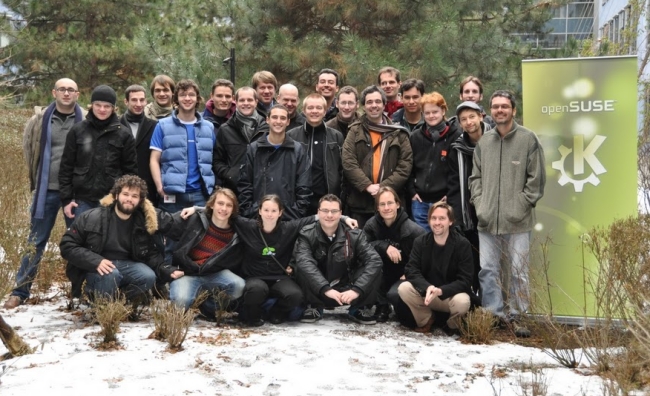Hello people and welcome to this week’s Kernel News, served OpenSUSE style!
-Let us start with the release of 2.6.34 and its’ impact in the digital press : Slashdot has an article announcing this here : http://rss.slashdot.org/~r/Slashdot/slashdot/~3/-VgxbnDvjiA/Linux-2634-Released, The H Online has a short(er) version of the “What’s new in 2.6.34” series here: http://www.h-online.com/open/features/What-s-new-in-Linux-2-6-34-1000122.html and of course a separate article with the announcement itself.
-Also, Phoronix has an article titled “Linux 2.6.34 Kernel Released! Time For 2.6.35”, written by Michael Larabel, where he highlights briefly what’s new in .34 as well as what’s to come in .35, from the available info about that.
-OSNews also writes about the release of 2.6.34; read all of that here: http://osnews.com/story/23312/Linux_2_6_34_Released
-Mathieu Desnoyers announced the release of the LTTNG tree for 2.6.33.4, version 0.214.
-The notify tree got updates, as announced by Eric Paris, for -rcX, in the following summary : “This branch holds a couple of bug fixes (two of which are actually stable material). A pathological race which would put us in a use after free / double free situation when one thread attempts to delete an inotify watch while another thread is still adding that watch. A memory leak and a Kconfig issue.”
-H. Peter Anvin posted five fixes for 2.6.34{,-rc8} in regard of the x86 tree.
-As usual, Steven Rostedt posted tracing fixes consisting of patches and a typo fix.
-Ingo Molnar and Arnaldo Carvalho de Melo both had perf or perf-tools-related fixes, Al Viro posted vfs fixes for .34, David Miller came up with networking fixes and improvements, Frederic Weisbecker tells about his tracing fixes for 2.6.35-rc1, again Arnaldo Carvalho de Melo posted some more perf fixes, Geert Uytterhoeven announced updates for the 2.6.35 in m68k (Motorola CPUs), Ingo also had fixes for the core- debugobjects tree (2.6.35) and the same Ingo posted patches for the core-iommu tree, again for 2.6.35.
-And of course, ladies and gents, how could we miss the official announcement of the man himself? Here’s Linus’ announcement regarding the release of 2.6.34: “Nothing very interesting here, which is just how I like it. Various random fixes all over, nothing really stands out. Pretty much all of it is one- or few-liners, I think the biggest patch in the last week was fixing some semantics for the new SR-IOV VF netlink interface. And even that wasn’t a _big_ patch by any means.
So 2.6.34 is out, and the merge window is thus officially open. As usual, I probably won’t do any real pulls for a day or two, in the (probably futile) hope that we’ll have more people running plain 2.6.34 for a while. But you can certainly start sending me pull requests. Go forth and test, Linus”
-Seems like Ingo Molnar’s been a busy bee this week as he posted, besides the fixes/patches already mentioned, other fixes for trees including locking, RCU, sched, tracing, atomic, cleanups, asm, doc, fpu, irq, hweight and oprofile; also for mm, mrst, txt, pat and uv. All these fixes are for the x86 architecture regarding 2.6.35.
-Jonathan Corbet of LWN fame posted some viafb and documentation patches, while Roland Dreier of Cisco posted a first batch of fixes for the Infiniband tree; Martin Schwidefsky had some patches for the s390 tree (for the 2.6.35 merge window) and Steven Whitehouse posted few patches for the GFS2 tree.
-Mauro Carvalho Chehab posted the minutes of the Hardware Error Kernel Mini-Summit, which was held April the 15th (http://events.linuxfoundation.org/lfcs2010/edac), so that other kernel hackers can
benefit from it.
-The nfs tree benefited from fixes aimed at 2.6.35, thanks to Trond Myklebust, and so did the sh tree, with the patches submitted by Paul Mundt – his fixes were aimed at 2.6.35-rc1.
-In another round of fixes, we see James Bottomley with SCSI fixes for 2.6.35, Thomas Gleixner with genirq, hpet and timer fixes/cleanups for .35 also, Tejun Heo also came up with fixes for percpu and workqueue (2.6.35-rc1), Daniel Walker has some fixes and a pull request regarding MSM mmc_sdcc driver updates, Rafael J. Wisocki with pm updates (suspend tree) for .35 and Mauro Carvalho Chehab posted improvements regarding the i7 processors, namely “for memory error detection for the Memory Controllers found on the Nehalem CPU’s, from i7core to Xeon 56xx,
via EDAC interface.”
-Samuel Thibault announced the release of hwloc 1.0 : “hwloc provides command line tools and a C API to obtain the hierarchical map of key computing elements, such as: NUMA memory nodes, shared caches, processor sockets, processor cores, and processor “threads”. hwloc also gathers various attributes such as cache and memory information, and is portable across a variety of different operating systems and platforms.
The hwloc team considers version 1.0 to be the first production-quality release that is suitable for widespread adoption. Please send your feedback on hwloc experiences to our mailing lists (see the web site, above).”
-Arnaldo Carvalho de Melo came up again with perf fixes , Jason Wessel with some improvements in kdb for .35, Dave Airlie posted fixes for drm meant for -rc1, Dominic Brodowski with PCMCIA (for 2.6.35), Rusty Russell – modules, and, in the other fixes category, we have Avi Kivity with KVM fixes, Frederic Weisbecker having fixes for the random-tracing tree, Rusty Russell again with virtio
patches, Jiri Kosina of OpenSUSE with HID and trivial (trivial is actually a tree :)) and Ian Campbell with a Xen suspend/resume fix.
-Stephen Hemminger announced the appearance of an new version for iproute2 for 2.6.34, stating “This version of iproute2 utilities intended for use with 2.6.34 or
later kernel, but should be backward compatible with older releases. In addition to build and man page fixes, this release includes a support for several new features:
* SR-IOV (I/O Virtualization) support.
* tuntap support
* bus-error reporting and counters
* new FIFO type head drop queue discipline”
-Jeff Garzik announced quite a few libata updates and fixes for 2.6.35, while Kevin Hilman asked Linus to pull some RTC fixes for the davinci tree, targettin .35; in other non-x86 arch fixes and news, David Miller posted some sparc fixes and an ARM MSM update from Daniel Walker, also targetting 2.6.35.
-XFS updates targetting -rc1 were posted by Alex Elder, the async_tx tree got updated by Dan Williams while David Miller announced significant improvements for the networking tree with the following (lengthy) message : “The biggest two things in here are RPS (Receive Packet Steering) and RFS (Receive Flow Steering) support from Tom Herbert et al.at Google.
RPS allows one to specify a cpu mask per device RX queue, and we will steer RX packet work, in software, to those cpus. RPS essentially provides in software what many modern cards can do in hardware with the added flexibility of being able to constrain CPU targets arbitrarily. RPS is also, therefore, not in conflict with cards that can flow distribute to cpus completely in hardware.
RFS tries to be even more sophisticated than RPS. It watches on which cpu a socket makes I/O calls, and will steer future RX packets to that cpu. In this way RX packet work is done near to where the application will actually process the data.
In both the case of RPS and RFS, if the device provides a flow hash (just about every modern card does), we make use of it instead of computing it in software. RPS/RFS has been found to even help for things like tbench over loopback.”
-Nicholas A. Bellinger announced “that the v3.4.0 stable release of TCM/LIO has been tagged and branched into lio-core-2.6.git/lio-3.4. This release is now tracking upstream linux-2.6.34.y.git for future stable kernel releases.”
-Speaking of announcements, Mathieu Desnoyers announced ltt-control v 0.85 with the following words : “I just released ltt-control 0.85 which waits for previous subbuffers to be written to disk(using sync_file_range()) and uses fadvise to tell the kernel that pages won’t be reaccessed. This lessens the tracer impact on the page cache.”
-Len Brown posted fixes in the acpica tree for 2.6.35, Mauro Carvalho Chehab has new patches for V4L/DVB, Paul Mundt has a number of patches for the Genesis machines (-rc1) and Takashi Iwai updated the sound tree with some patches for -rc1.
-Con Kolivas announced 2.6.34-ck1 with a quite short announcement, followed by the list of patches. Con also made the following announcement : “This is to briefly announce the availability of the desktop interactivity focused BFS CPU scheduler v0.318 for the new stable linux 2.6.34 kernel.This version is also available for 2.6.32 and 2.6.31.”
-Artem Bityutskiy posted git pull requests related to ubi and ubifs for 2.6.35, while Matthew Garett has some x86 driver changes also for 2.6.35. Dmirty Torokhov pushed updates for the input tree affecting -rc0 and David Teigland fixed some lockups and posted cleanups for the dlm tree; in other push news, Frederic Weisbecker made another series of perf fixes pertaining to perf_event.c, namely a fix in preempt_enable(), Arnaldo Carvalho de Melo also has fixes for the perf tree, USB patches for .35 came from OpenSUSE’s Greg Kroah-Hartman, the ocfs2 tree got updated by Joel Becker (2.6.35 as target) and Sascha Hauer posted some changes related to Arm i.MX.
-Andrea Arcangeli posted a very interesting idea regarding the use of transparent huge pages on load-critical systems, like the ones running scientific applications, JVM or gcc builds; since the annoucement is too big, I won’t post it here, but if you’re interested, you may wanna check the list archives.
-In closing this week’s edition, some noticeable changes/fixes are : OMAP DSS updates for .35 (Tomi Valkeinen) and powerpc fixes by Benjamin Herrenschmidt.
That’s it, see you next week!
 The guy who comes in to S.u.S.E, SuSE and Novell every day since exactly ten years now is
The guy who comes in to S.u.S.E, SuSE and Novell every day since exactly ten years now is  On this week the leading KDE developers met
On this week the leading KDE developers met 